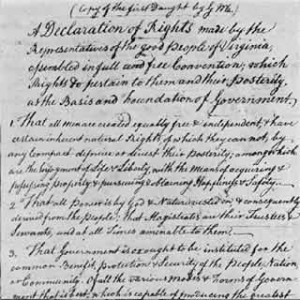Yesterday I highlighted some of the key concepts in the Virginia Declaration of Rights, written by George Mason in 1776. Mason also included some interesting phrases in that Declaration. When you get to the end of it, he offers some memorable comments.
 For instance, Section 15 says, “That no free government, or the blessings of liberty, can be preserved to any people, but by a firm adherence to justice, moderation, temperance, frugality, and virtue, and by frequent recurrence to fundamental principles.”
For instance, Section 15 says, “That no free government, or the blessings of liberty, can be preserved to any people, but by a firm adherence to justice, moderation, temperance, frugality, and virtue, and by frequent recurrence to fundamental principles.”
I like that one. Why? First, it concentrates on character. Mason is saying that liberty is not automatic; rather, to achieve it and to maintain it, the people must have certain character qualities. Second, he refers to fundamental principles. The only way to stay on course is to remember the basic truths that govern the universe. Too many politicians—and the general public—today don’t even think about principles. They seek political advantage, not truth.
He then added Section 16, which states, “That religion, or the duty which we owe to our Creator, and the manner of discharging it, can be directed only by reason and conviction, not by force or violence; and therefore all men are equally entitled to the free exercise of religion, according to the dictates of conscience; and that it is the mutual duty of all to practice Christian forbearance, love, and charity towards each other.”
This section is a recognition that a state-approved religion is unacceptable. Civil government has no business setting up an official religion that all people must follow. Our relationship to God is outside the purview of state power. We must follow our conscience in that relationship, and no one else can be our conscience on that matter. Now some may think Mason was pushing for religion to be removed from the public square, but that was never his intent. Notice the final part: each person has a duty to practice “Christian” love toward others. Mason fully expected that Christianity would be the bedrock faith of the nation, and he expected individuals to act like Christians in their relations to others.
As I said in yesterday’s post, these Founders understood government. I’ll add this today: they understood it better than most of our current crop of legislators, executives, and judges. When I was working on my doctoral degree in history, I was always amazed by the attitude of professors who believed that we know so much more than people from 200 years ago.
No, we don’t.
